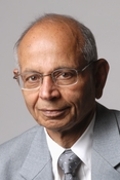
Povindar Kumar Mehta
Roy W. Carlson Distinguished Professor of Civil and Environmental Engineering, Emeritus
Professor Povindar Kumar (PK) Mehta was a giant in the science and technology of concrete. He was born in Nurpur, India, on August 27, 1930. PK completed his undergraduate studies in chemical engineering at the University of Delhi and moved to the United States for graduate studies. He received an M.S. degree in ceramic engineering from North Carolina State University and a Ph.D. in materials science and engineering from UC Berkeley. He retired in 1992 after 30 years on the Berkeley faculty.
In the early '60s, Berkeley was the most exciting place in the world to study new cements capable of reducing cracking in concrete. Professor Alexander Klein, a civil engineer and the inventor of an expansive cement (Type K, after Klein). realized that continuing progress would require a deep expertise in chemistry, so he hired PK as a research assistant. This was an inspired decision because, for the next 40 years, PK was a pioneer and leader in the field of green cements and concrete.
Professor Mehta was always ready to tackle challenging problems related to materials and their impact on the environment. For example, he realized that California had a massive amount of rice husks, produced during the de-husking operation of paddy rice. As they are bulky, the husks presented an enormous disposal problem for centralized rice mills. He discovered an industrial process to produce, by controlled combustion, a very reactive ash capable of partially replacing Portland cement. This approach took care of the rice byproduct and at the same time was capable of reducing the carbon footprint of concrete. For this breakthrough, he became a hero in Asia, Latin America, and other places with large rice production.
The reduction of the carbon footprint of concrete became his great passion. Professor Mehta was the driving force for the development of green concrete where 50% of Portland cement is replaced by fly ash, a byproduct from the coal industry. His pioneering work modified the construction industry, and nowadays a high amount of cement replacement has become standard practice. His original research was recognized with prestigious awards, among them, the American Concrete Institute (ACI) Wason medal for Materials Research, the ACI Construction Practice Award, ACI/ CANMET award for outstanding contributions, and an ACI/ CANMET award for research contributions to supplementary cementing materials. In 2006, Mehta received an honorary membership to the American Concrete Institute, its highest distinction. The Institute recognized his dedicated teaching and research in concrete materials technology and his impact in inspiring the concrete industry to be sustainable. In addition to his teaching and research, he served the campus as an active member of the Academic Senate, with a total of ten years' service on five different committees. On his retirement, he was awarded the Berkeley Citation for his contributions to the university.
Besides his seminal archival papers on cement and concrete, PK obtained nine patents in the area of cement and concrete technology. He authored or coauthored four books, including a textbook: Concrete: Microstructure, Properties, and Materials, which has been extensively referenced and has been translated into Chinese, Japanese, Portuguese, Spanish, and Farsi.
Professor Mehta inspired his students to be superb and ethical researchers. Professor Kim Kurtis at Georgia Tech University states that “he will be remembered as among the very first to 'ring the bell' about the important and vital role that concrete plays in making sustainable infrastructure possible to serve the growing global population. His vision has incited change in the industry and the way concrete is made around the world.” Professor Kevin Folliard from the University of Texas recalls that “I learned more from Professor Mehta about life than I did about concrete. I learned about being compassionate. I learned about being selfless. I learned about being generous. Not to detract from everything I learned from him about cement and concrete, …which I am eternally grateful for…having been his last Ph.D. student, I will always remember Professor Mehta first as a great person. When I attended his funeral service last year, you could see the impact he had on his family, his friends, and people from all walks of life who were lucky enough to have met this incredible man. He will be greatly missed, but his legacy will live on through those that knew and loved him.”
Professor Mehta also made numerous humanitarian contributions. Fifty years ago, he established the Front for Rapid Economic Advancement (FREA), raising funds for humanitarian causes in India. Over time, FREA evolved into ICA (Indians for Collective Action), which raised 8 million dollars and distributed it to over 300 charitable foundations. PK was committed to expanding the role of spiritual awareness in everyday life and, with this goal in mind, he co-founded AHIMSA, a non-profit organization dedicated to nonviolence. The AHIMSA series seminars and workshops had significant influence in the Bay Area with many distinguished speakers, such as Geoffrey Chew, Marian Diamond, Michael Nagler, Swami Prabuddhananda, Ruth Richards, and Huston Smith. PK also actively contributed to the Himalaya Foundation and the Vivekananda Foundation Literacy Project. To help educate young engineering students on the importance of sustainable materials, he generously donated to UC Berkeley to create the P.K. Mehta Fellowship. Many of the recipients of this fellowship are now in leadership positions in the industry or in academia.
Professor Mehta passed away on August 7, 2019. He is survived by his wife Shanti, daughter Nita, son Samir, son-in-law law Anil, and grandchildren Daniel, Hannah, Neil and Sarah. We will miss him dearly not only for his knowledge and kindness but also for being our moral compass.
Paulo J.M. Monteiro
Filip C. Filippou
Jack P. Moehle
Claudia P. Ostertag
2020
